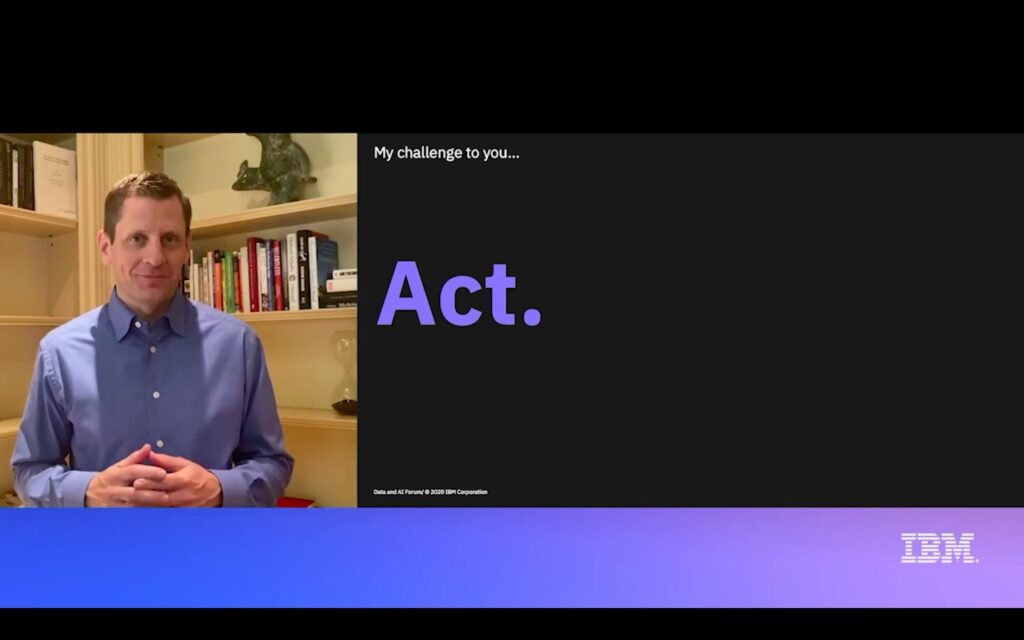AI is about giving your CIO superpowers, says IBM

There’s no AI without IA.
“Your AI is only as good as your data. That’s why we like to say there’s no AI without IA — meaning information architecture,” Rob Thomas, SVP, Cloud and Data Platform of IBM, said in his keynote at today’s Data and AI Virtual Forum ASEAN.
Data-driven superpowers
IBM ASEAN Regional Managing Director Patricia Yim kicked off the Data and AI Virtual Forum ASEAN with her welcome address. She said the forum would tackle the whole AI journey. From how AI will enable companies to act, to building trust, to showcasing what’s next in AI.
Thomas pointed out that every company is trying to deliver real-time answers. This is even more true in the wake of the COVID-19 pandemic. Now, artificial intelligence (AI) for business solutions such as IBM Watson AIOps have become even more vital. AI helps companies automate processes and provide more value to customers.
According to Thomas, IBM Watson AIOps acts as the central nervous system watching over everything happening in your organization.
“As we worked with early clients on Watson AIOps, the resolution times we’re seeing are staggering. So when something happens, Watson AIOps goes to work. What would have taken days to resolve now gets resolved within hours. What would have taken hours to resolve now gets resolved within minutes. This is all about using AI to give your CIO superpowers,” Thomas said.
Automation, however, is only the first step, Thomas said. It empowers CIOs so that they can have a different way of managing their IT infrastructure.
The next step is realizing that AI and automation are only as good as the integration and the ecosystem. Companies already have an existing infrastructure, so the success of AI depends on how well it is integrated, and the ecosystem in which it plays.
From data to insights to actions
Thomas challenged companies to act, instead of just reacting to events, or to the moves of their competitors. AI, he said, will empower businesses and enable them to always act, so that it will be competitors who will be reacting to them.
For his part, Kitman Cheung, CTO, Data and AI, Asia Pacific of IBM, pointed out the value of data is not just in the data itself.
“The quality of the artificial intelligence algorithm is only as good as the data that you feed into it,” Cheung said.
From that perspective, what’s important is to find a way to derive the most business value from your data, he said.
In his presentation, Cheung took participants through what he dubbed as an “Overly Simplistic Theory of the Value of Data”. He showed that the value of data is not simply equal to the data itself. This is because data contains a lot of noise, which you must remove to turn data into information or insight.
“So perhaps, the value of data is proportionate to the information… Now I changed the equal sign to the proportionality sign because I don’t want any mathematician in the audience to get upset at me,” Cheung quipped.
Timeliness of information
This proportionality, however, still does not describe the value of data. Cheung pointed out that the value of data goes down as time passes.
“The longer it takes for us to get to that data and to get to that insight, the less valuable that data becomes,” he said.
Meanwhile, the time it takes to do this is dependent on the rate of work by people and the rate of work by hardware.
Getting the insight, however, is one thing. Acting upon that insight is another. Echoing Thomas, Cheung stressed that the success of businesses will depend on how quickly they can act upon these valuable insights.
This is why AI maximizes the business value of your company’s data. It increases productivity via automation, gives a better understanding of the whole organization, and augments human intelligence.
So, have you already given your CIO superpowers?
One thought on “AI is about giving your CIO superpowers, says IBM”